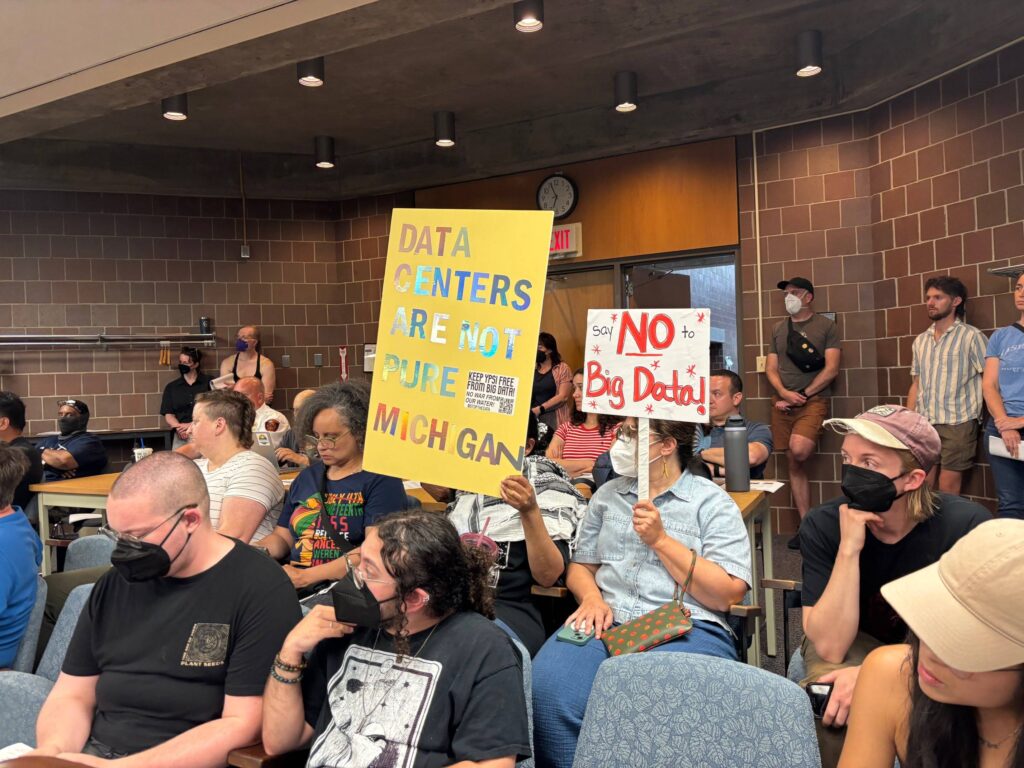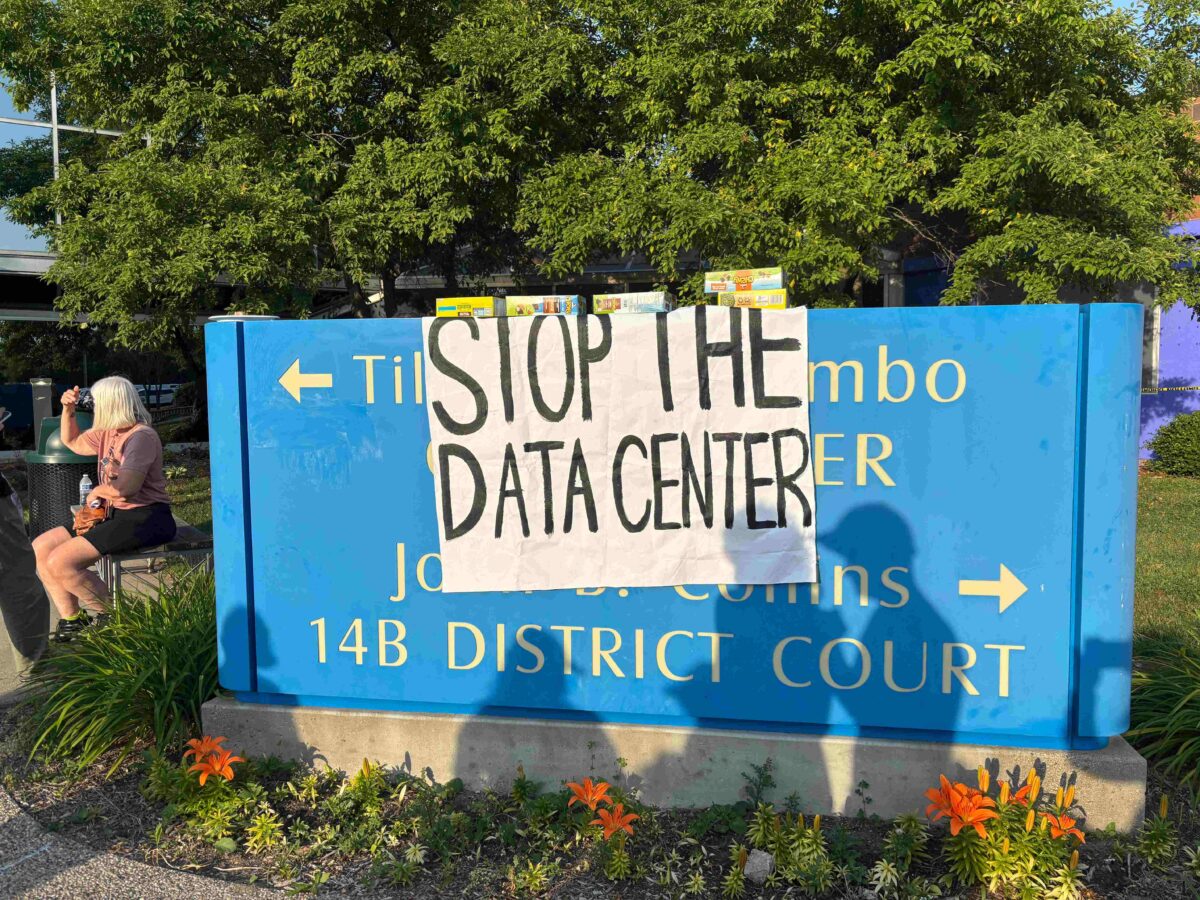Overview:
-The University of Michigan is not required to submit plans to Ypsilanti Township for a $1.2 billion data center project on Textile Road, says township board.
-Construction will begin in 2026, according to the Michigan Economic Development Corp.
-"They're coming here because they think that our local government would be easier to manipulate," one speaker tells the Ypsilanti Township board.
The drumbeat from a demonstration outside Ypsilanti Township Civic Center provided the backdrop when roughly 80 residents showed up to a township board meeting Tuesday, many to speak out against the University of Michigan’s plans to build a $1.2 billion data center project in partnership with Los Alamos National Laboratory.
Residents voiced concerns about a power- and water-hungry data center development’s potential to harm the Huron River, increased water and electricity rates, and support drone warfare and surveillance technology.
Township officials suggested in a statement this week they have limited power over the project because the University of Michigan and other state schools are exempt from zoning rules. The project will not “take or return water from the Huron River,” according to the statement.
The 124 acres of land, located south of the Huron River’s Ford Lake Dam, is slated for use in artificial intelligence research, including both classified and non-classified elements, MLive previously reported.
The $8.1 million purchase of the properties at 10455 and 10635 Textile Road received approval June 12 by the University of Michigan Board of Regents, WXYZ reported earlier this month.
U of M has yet to submit plans for the project to the township and is not required to do so, township officials said. Construction will begin on the project in 2026, according to the Michigan Economic Development Corp., a public-private partnership that provided a $100 million grant for the facility.
“They will bring the biggest, baddest, fastest computer in the world, because that’s what they have to have to do in their work to protect us and to protect our citizens here in the United States,” Chris Kolb, University of Michigan vice president for government relations, said at a Michigan Strategic Fund Board meeting in December, MLive reported.
Activists voiced alarm Tuesday about the partnership with Los Alamos, which was involved in the development of the atomic bomb and provides scientific and engineering support for national security programs, according to the Department of Energy.
Michigan Gov. Gretchen Whitmer signed tax breaks for large data centers into law at the end of 2024, legislation that sparked concern over potential threats to water resources and state climate goals as well as the potential for the facilities to increase residents’ utility bills.
Data center energy demands have kept coal generation online. The facilities can use millions of gallons of water a day to cool servers, The Washington Post reports.
Local communities can benefit from the millions of dollars in property taxes brought in by the facilities, but Ypsilanti Township officials noted the University of Michigan is exempt from paying taxes.

Data center project raises climate, noise, surveillance concerns
Almost all of the speakers at Tuesday’s meeting oppose U of M’s data center project, warning officials not to trust university officials about potential impacts.
“I fight against pipelines, and we always end up paying,” said Andrea Pierce, policy director for the Michigan Environmental Justice Coalition, warning the facility would increase water and electricity rates. She added that the project’s energy demands could jeopardize the Resilient Washtenaw Plan, which looks to achieve countywide carbon neutrality by 2035.
Ypsilanti Township resident Vidhya Aravind said the project could be used to advance water-intensive artificial intelligence and surveillance technology.
“We can see this kind of technology being used to deport our neighbors,” Aravind said.
Sean Knapp, director of service operations for the Ypsilanti Community Utilities Authority, sought to allay concerns about water impacts. The system is operating below capacity, and the project’s use of YCUA water wouldn’t impact the community’s water service, he said.
“Adding the data center as a customer would help mitigate overall costs by improving efficiency and cost distribution,” Knapp said. He said he was unable to comment on potential discharges into the Huron River, as the subject falls under the Michigan Department of Environment, Great Lakes, and Energy’s jurisdiction.
Several speakers expressed concern about potential noise pollution and vibration from the facility.
In Virginia’s “data center alley,” the Prince William Board of County Supervisors was considering an ordinance to address noise from an Amazon data center this spring, The Prince William Times reported.
MORE REPORTING FROM PLANET DETROIT
What does AI mean for Michigan’s environment?
Michigan’s tax breaks for data centers may raise energy costs, increase water usage and jeopardize the state’s climate plan as AI technology advances.
Whitmer signs data center bill, utility regulator worries about stranded assets
Governor Whitmer has signed a use tax exemption for large data centers in Michigan, potentially attracting wealthy companies to the state. Environmental advocates warn that the high water and energy demands of these facilities could undermine state climate goals and raise residents’ utility bills.
Michigan House OK’s data center tax break that advocates say threatens climate goals
Critics say water and power-hungry data centers could increase prices for utility customers, deplete groundwater and compromise Michigan’s renewable energy targets.
Residents warn data center project will create ‘sacrifice zone’
Speakers at Tuesday’s meeting urged township officials to find ways to block the data center project, with some saying U of M is turning Ypsilanti Township into a “sacrifice zone,” putting an environmentally impactful project in an area where it is less likely to encounter resistance.
“They’re coming here because they think that our local government would be easier to manipulate … they’re tired of the wrestling match they have in Ann Arbor,” a speaker who identified himself as Whitney, a local farmer, told township officials.
Brian, who said he’s a community member, told the board: “Even if you think that this body … does not have the power to stop this, we need you to go home tonight and reconsider your understanding of the matter.”
EGLE and Ypsilanti Township did not immediately respond to Planet Detroit’s questions about permitting for the project.
Resident Monica Ross-Williams said she doesn’t think the township can prevent the project, but should at least demand community benefits, like paying to build an amphitheater included in a recent parks plan.
“I think the township board should actually demand something from U of M,” she said. “They should not get that land, pretty much for just how much (it’s) going to pay in water.”
The township said in its June 17 statement the University of Michigan has “verbally agreed” to “extensive community engagement.” As of June 13, U of M said it was under a nondisclosure agreement and unable to schedule any engagement events, according to the township board.





